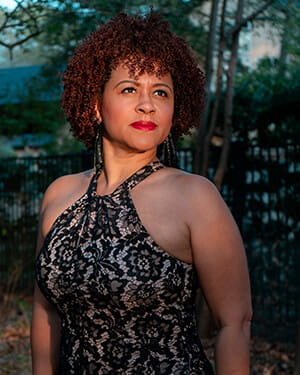When hairstylist Tammy Jolivette’s clients came to her for advice on their natural curls and coils, she recalled the similarities with her own hair journey and its profound effects on her life.
Growing up biracial in Houston, Texas, Jolivette was turned away by stylists who didn’t know how to work with her textured hair. Confused and discouraged, she used harsh, expensive chemicals to straighten it. She, like many other Black women, felt pressured to conform to the Eurocentric standards of beauty to feel more accepted.

“There were societal and psychological issues that prevented me from feeling confident about wearing my hair naturally,” says Jolivette, a Walden University PhD in Psychology student and MS in Psychology graduate. “When people of color are rejected from salons or criticized because of the natural texture of our hair, it affects how we feel about ourselves.”
Deciding to go fully natural with her hair was a pivotal moment in Jolivette’s life that led her to create social change in her community and profession. She decided to launch an educational platform called The Texture of Me, which serves as an advocacy network to bring awareness to the psychological benefits and implications of women wearing their textured hair naturally. She provides therapy, education, products and a community to help women overcome any obstacles or concerns. She guides them through the journey and teaches them how to embrace their hair to boost self-love, self-worth self-value, and self-confidence.
“The psychological struggles I went through were the same as my clients,” says Jolivette. “We became a support group for each other.”
Jolivette’s clients include people who have had unpleasant experiences at other salons because they did not know how to style their hair. Other clients had been reprimanded at work because their employers’ biases deemed natural Black hair as “unprofessional.” Some were excluded from school activities because their hairstyles didn’t conform to discriminatory school dress codes.
A 2019 study by Dove showed that “a Black woman is 80% more likely to change her natural hair to meet social norms or expectations at work.” Additionally, Black women are 83% more likely to report being judged more harshly on their looks than other women.
The dehumanization of Black hair in America can be traced back to slavery when slave traders captured and shaved the heads of Africans, robbing them of their culture and identity. In the 1800s, free Louisiana Creole women donned elaborate hairstyles that displayed their curls and coils with an air of regality until the Tignon Laws required they wear a scarf, or tignon, over their hair to designate they were part of the “slave class.”
Discrimination continued through the signing of the Civil Rights Act of 1964, which “ended segregation in public places and banned employment discrimination.” While the landmark civil rights and labor law prohibited discrimination on the basis of race, color, religion, sex or national origin, it didn’t prevent racism and microaggressions. In 2019, the CROWN Act, which stands for “Creating a Respectful and Open World for Natural Hair,” was created to prohibit race-based hair discrimination, which is the denial of employment and educational opportunities because of hair texture or protective hairstyles including braids, locs, twists or bantu knots. As of 2020, it has only been signed into law in seven states.
“Michelle Obama, one of our most significant modern-day Black role models, has faced criticism because of her hair,” says Jolivette. “I wondered if this was another aspect of racism toward the Black community. What were the psychological roots of this bias, and how did it affect people like my clients?”
Jolivette is exploring those questions through her doctoral research at Walden, which aims to identify the lived experience of self-perception by African American females in wearing their hair naturally. Her goal is to expose discrimination against textured hair and its psychological effects on the Black community. She also wants to empower women to embrace their natural and unique beauty.
“I went into the hair industry to boost people’s confidence and make them feel good,” says Jolivette. “Prejudiced ideas about hair can keep Black people from advancing at work or school. This can color how they feel about their appearance starting at a young age. It’s pervasive in our culture.”
She’s found this bias means textured haircare is rarely, if ever, taught in cosmetology schools. Stylists don’t learn about it without specifically seeking information. Many salons don’t employ stylists with experience with minority hair and hairstyles, which results in them turning away or not being able to properly service Black clients.
“I noticed this never seemed to be discussed in the hair industry,” says Jolivette. “The industry is segregated.”
By only teaching stylists to work with Caucasian hair and hairstyles, she says the cosmetology industry can reinforce the way society misinterprets natural Black hair as a statement that the wearer is radical, rebellious, political or militant. Hair is usually just a form of self-expression.
Jolivette hopes that shining a light on the issue of hair discrimination can help further illuminate the roots of racism and the expression of bias, whether explicit or implicit. She encourages people to talk to those who wear their hair naturally to get their insights on racism. She also recommends avoiding microaggressions like unwanted hair touching or asking if curls are real.
“I want to create the social change that causes the hair industry to rethink its role in this problem,” says Jolivette. “Maybe employers will reconsider outdated policies about appearance, or schools will make changes to their dress code. I really want to raise awareness about this issue, both in salons and as a topic to study further within the field of psychology.”



